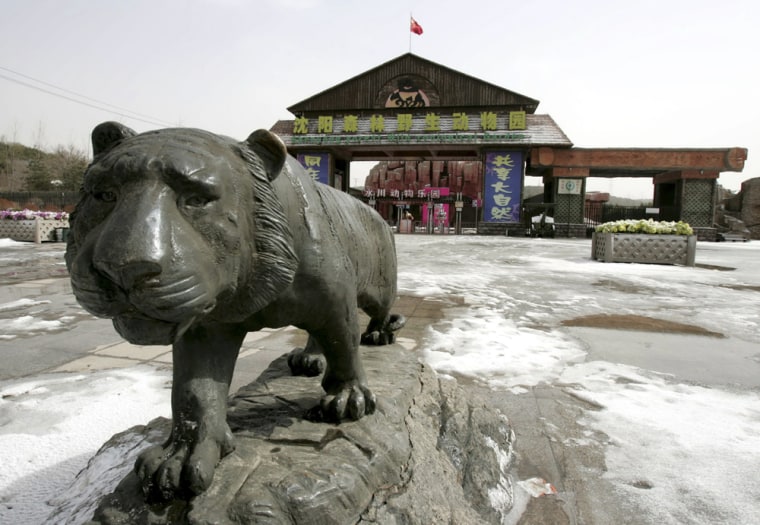Eleven rare Siberian tigers kept in small cages and fed only chicken bones have died of malnutrition at a cash-strapped zoo in China's frigid northeast, state media said Friday.
A manager at the Shenyang Forest Wild Animal Zoo in Liaoning province, however, said the animals had died of disease.
Siberian tigers are one of the world's rarest species, with just 300 believed remaining in the wild.
Liu Xiaoqiang, vice chief of the Shenyang Wild Animal Protection Station, a local animal protection agency, was quoted by the China Daily as saying 11 of the zoo's tigers died of malnutrition in the last three months after subsisting on a meager diet of chicken bones.
Two others were shot dead by police in November after the hungry animals attacked a zookeeper, the report said.
Iron crates
The Liaoshen Evening Post, a local Shenyang newspaper, reported on its Web site that the company that owns the zoo was trying unsuccessfully to auction the zoo property, and many staffers complained they hadn't been paid in 18 months.
Wu Xi, one of the managers of the Shenyang Forest Wild Animal Zoo Co. Ltd., told The Associated Press that "various kinds of diseases" had killed 11 tigers at the zoo over the past three months.
Wu said the animals were kept in iron crates indoors because it was an unusually cold winter and the zoo had no heating. He refused to specify what diseases the animals had or respond to allegations they starved to death.
The China Daily said the zoo was mainly privately owned, though the Shenyang municipal government holds a 15 percent stake.
Xie Yan, China director for the New York-based Wildlife Conservation Society, said many Chinese zoos and wildlife parks have more tigers than they can afford to keep.
The animals are expensive to take care of because they require a lot of food and space to roam and ticket sales generally aren't enough to support them.
'Massive blow'
Xie said Chinese zoos began breeding tigers in the 1980s and captive populations increased rapidly in the 1990s. There are now about 6,000 captive tigers of various species in China, she said, but it's not clear how many of those are Siberian tigers.
"In the past two or three years, people have started to realize it's become a problem," she said, referring to zoos that have more animals than they can afford to keep.
Xie said the government should do more to regulate zoos and enforce standards for animal care. She also said birth control is needed to keep the captive tiger population at manageable levels.
Chris Chaplin, a spokesman for WWF International's Beijing office, said the news was "a massive blow" to conservation efforts.
WWF colleagues in Changchun, the capital of Jillin province, which neighbors Liaoning, were investigating the allegations, he said.
